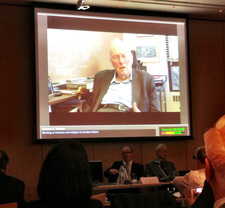New
In Memoriam: Charles Townes, inventor of laser, dies at 99.
Charles Hard Townes, a professor emeritus of physics at the University of California, Berkeley, who shared the 1964 Nobel Prize in Physics for invention of the laser and subsequently pioneered the entirely new industry, died on Jan. 27.
Townes was 35 in the spring of 1951 when he found the solution to a longstanding problem, how to create a pure beam of short-wavelength, high-frequency light. That revelation not much different from a religious revelation, Townes believed eventually led to the first laser, a now ubiquitous device common in science, telecommunication, entertainment and medicine, including phototherapy for vitiligo. Throughout his life, Townes maintained an interest in the intersection of science and religion.
VR Foundation had the privilege of inviting Charles Townes to the Roundtable On Vitiligo in Kitzbuhel, Austria in 2012, watch the video here . We wish his family our sincerest condolences at this time of loss, and we hold Professor Townes, one of the greatest scientists of the twentieth century, in fond and respectful memory.

FAQOther Questions
- Is there a traditional medicine to treat vitiligo?
Traditional remedies can be helpful for managing stress or general metabolic health, but when it comes to vitiligo, the evidence is limited. While some natural supplements provi...
- Can Ginkgo Biloba help with vitiligo?
Ginkgo Biloba offers a promising, simple, and relatively affordable option for managing vitiligo. Known for its anti-inflammatory, immunomodulatory, and antioxidant properties, ...
- Can Ayurveda help with vitiligo?
Ayurveda, the ancient Indian system of holistic medicine, focuses on balancing body energies (Doshas) and improving digestion. While it offers a valuable perspective on "whole-b...
Though it is not always easy to treat vitiligo, there is much to be gained by clearly understanding the diagnosis, the future implications, treatment options and their outcomes.
Many people deal with vitiligo while remaining in the public eye, maintaining a positive outlook, and having a successful career.
Copyright (C) Bodolóczki JúliaBy taking a little time to fill in the anonymous questionnaire, you can help researchers better understand and fight vitiligo.
